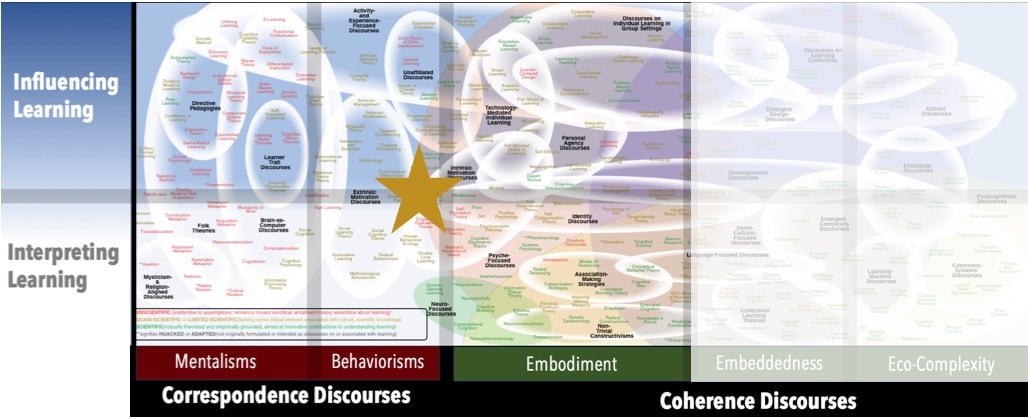AKA
Formal Learning
Informal Learning
Nonformal Learning
Focus
Types of settings and intentions associated with human learningPrincipal Metaphors
The categories of Formal Learning, Non-Formal Learning, and Informal Learning represent a typology of formats or sites of learning. This typology can be applied across virtually all metaphors and theories of learning.Originated
1990sSynopsis
The Organisation for Economic Co-operation and Development (OECD) defines three forms of learning:- Formal Learning (Compulsory Education; Schooling) usually involves certified teachers, accredited curricula, and institutional settings. It is often associated with formal testing, reported progress, and the earning of credentials.
- Non-Formal Learning refers to structured learning situations that happen outside of formal educational structures. It might still involve certified teachers, but such learning is motivated more by personal interest than imposed requirements.
- Informal Learning (Out-of-School Learning; Tacit Learning) happens outside of formal educational structures and happens as a result of one's engagements in various activities that are undertaken for other reasons. That is, from the point of view of the learner, such learning is more a by-product than a goal of activity (see Incidental Learning).
Commentary
The cluster of Formal Learning, Non-Formal Learning, and Informal Learning is a device for making distinctions – and so its value and utility depends on one’s needs and applications. The fact that is was authored by a political-economic interest (the OECD) should give pause. That said, there are discourses rooted in education that cover very similar ground. For instance:- Civic Engagement (Civic Participation) – broadly speaking, any activity oriented by matters of public concern, including any individual or collective effort aimed at positively influencing a community
- Cross-Contextual Learning (Amy Voss, 2010s) – the suggestion that learning is likely to be enhanced if educators involved in or associated within Formal Learning, Non-Formal Learning, and Informal Learning experienced planned learning together, cross-referenced learning activities, and encouraged reflection across those activities
- Public Pedagogy (Public Sphere Pedagogy) – Most broadly understood, Public Pedagogy aligns with Informal Learning and Nonformal Learning in a shared focus on sites and types of learning that occur beyond the scope of schools. Some versions place a strong emphasis on civic engagement and/or focusing content on/through public issues. Still others are more explicitly aligned with Activist Discourses, aiming at conscientization and activism.
- Vocationalism (various, c. 1700s, in the early stages of the Industrial Revolution) – the perspective that the focus of formal education should be determined by the needs of the economy – that is, according to marketability of skills, available job openings, requirements of industry, and so on. Associated discourses include:
- New Vocationalism (various, 1970s) – a Vocationalist perspective that layers in the suggestion that the development of vocation-specific skills are best learned on the job
Authors and/or Prominent Influences
OECDStatus as a Theory of Learning
The distinctions among Formal Learning, Non-Formal Learning, and Informal Learning do not constitute a theory of learning.Status as a Theory of Teaching
No specific perspectives on or theories of teaching are associated with Formal Learning, Non-Formal Learning, or Informal Learning.Status as a Scientific Theory
Formal Learning, Non-Formal Learning, and Informal Learning constitute a typology, not a scientific theory.Subdiscourses:
- Civic Engagement (Civic Participation)
- Cross-Contextual Learning
- Formal Learning (Compulsory Education; Schooling)
- Informal Learning (Out-of-School Learning; Tacit Learning)
- New Vocationalism
- Non-Formal Learning
- Public Pedagogy (Public Sphere Pedagogy)
- Vocationalism
Map Location

Please cite this article as:
Davis, B., & Francis, K. (2024). “In-/Non-Formal Learning” in Discourses on Learning in Education. https://learningdiscourses.com.
⇦ Back to Map
⇦ Back to List
